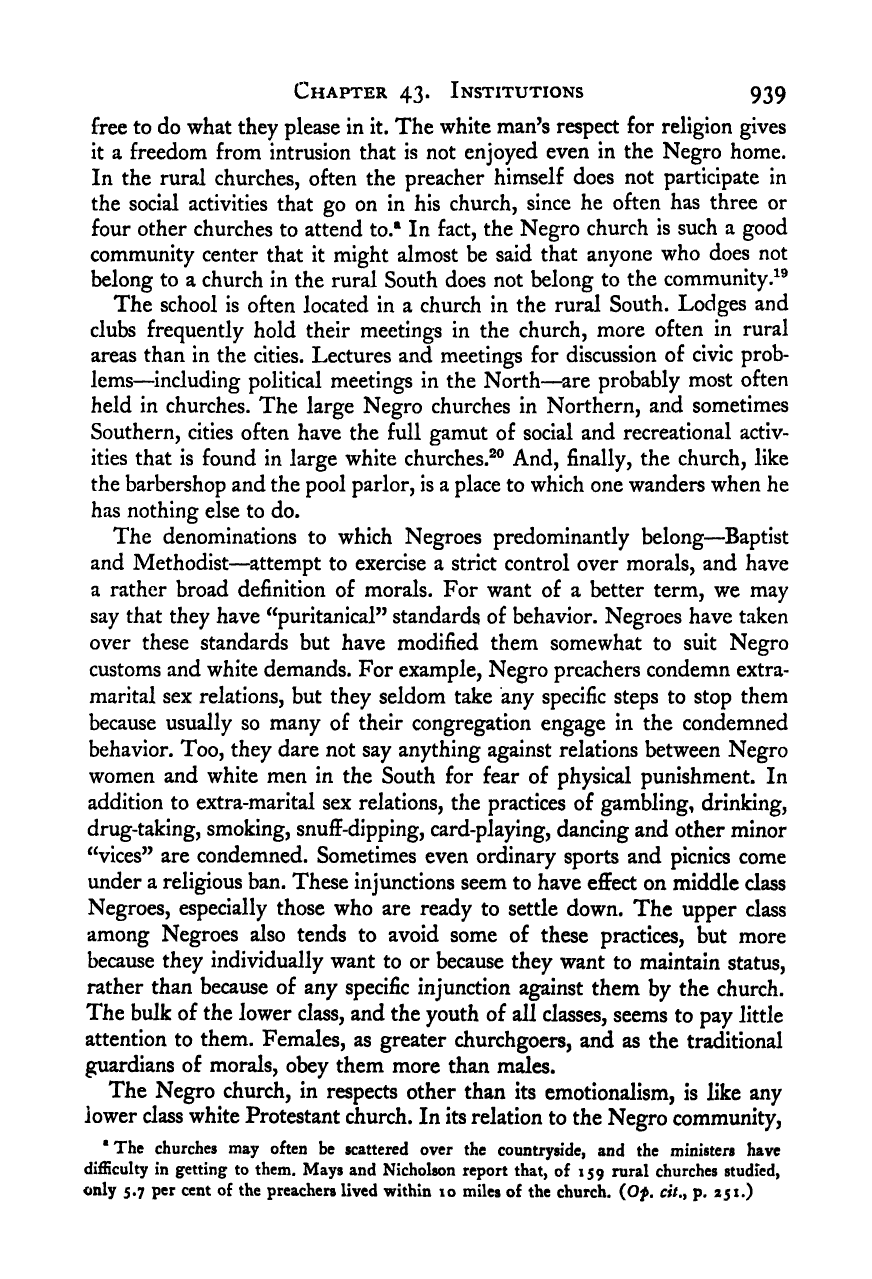Note: Gunnar Myrdal died in 1987, less than 70 years ago. Therefore, this work is protected by copyright, restricting your legal rights to reproduce it. However, you are welcome to view it on screen, as you do now. Read more about copyright.
Full resolution (TIFF) - On this page / på denna sida - X. The Negro Community - 43. Institutions - 3. The Negro Church in the Negro Community

<< prev. page << föreg. sida << >> nästa sida >> next page >>
Below is the raw OCR text
from the above scanned image.
Do you see an error? Proofread the page now!
Här nedan syns maskintolkade texten från faksimilbilden ovan.
Ser du något fel? Korrekturläs sidan nu!
This page has never been proofread. / Denna sida har aldrig korrekturlästs.
Chapter 43. Institutions 939
free to do what they please in it. The white man’s respect for religion gives
it a freedom from intrusion that is not enjoyed even in the Negro home.
In the rural churches, often the preacher himself does not participate in
the social activities that go on in his church, since he often has three or
four other churches to attend to.® In fact, the Negro church is such a good
community center that it might almost be said that anyone who does not
belong to a church in the rural South does not belong to the community.^®
The school is often located in a church in the rural South. Lodges and
clubs frequently hold their meetings in the church, more often in rural
areas than in the cities. Lectures and meetings for discussion of civic prob-
lems—including political meetings in the North—^are probably most often
held in churches. The large Negro churches in Northern, and sometimes
Southern, cities often have the full gamut of social and recreational activ-
ities that is found in large white churches.^® And, finally, the church, like
the barbershop and the pool parlor, is a place to which one wanders when he
has nothing else to do.
The denominations to which Negroes predominantly belong—Baptist
and Methodist—attempt to exercise a strict control over morals, and have
a rather broad definition of morals. For want of a better term, we may
say that they have ^^puritanical” standards of behavior. Negroes have taken
over these standards but have modified them somewhat to suit Negro
customs and white demands. For example, Negro preachers condemn extra-
marital sex relations, but they seldom take any specific steps to stop them
because usually so many of their congregation engage in the condemned
behavior. Too, they dare not say anything against relations between Negro
women and white men in the South for fear of physical punishment. In
addition to extra-marital sex relations, the practices of gambling, drinking,
drug-taking, smoking, snuff-dipping, card-playing, dancing and other minor
^Vices” are condemned. Sometimes even ordinary sports and picnics come
under a religious ban. These injunctions seem to have eflFect on middle class
Negroes, especially those who are ready to settle down. The upper class
among Negroes also tends to avoid some of these practices, but more
because they individually want to or because they want to maintain status,
rather than because of any specific injunction against them by the church.
The bulk of the lower class, and the youth of all classes, seems to pay little
attention to them. Females, as greater churchgoers, and as the traditional
guardians of morals, obey them more than males.
The Negro church, in respects other than its emotionalism, is like any
lower class white Protestant church. In its relation to the Negro community,
* The churches may often be scattered over the countryside, and the ministers have
di^culty in getting to them. Mays and Nicholson report that, of 159 rural churches studied,
only 5.7 per cent of the preachers lived within 10 miles of the church. {Of, cit,y p. 251.)
<< prev. page << föreg. sida << >> nästa sida >> next page >>